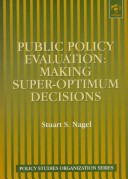Super-optimum decisions involve finding alternatives to controversies whereby conservatives, liberals, or other major groups can all come out ahead of their best initial expectations simultaneously. This book is organized in terms of concepts, methods, causes, process, substance and the policy studies profession. Concepts clarify that policy evaluation traditionally involves: 1. Goals to be achieved 2. Alternatives available for achieving them 3. Relations between goals and alternatives 4. Drawing a conclusion as to the best alternative in light of the goals, alternatives and relations 5. Analyzing how the conclusion would change if there were changes in the goals, alternatives, or relations. Super-optimizing also involves five related steps, but with the following improvements: 1. Goals are designated as conservative, liberal, or neutral 2. Alternatives get the same designations 3. Relations are simplified to indicate which alternatives are relatively high or low on each goal 4. The conclusion involves arriving at an alternative that does better on Goal A than Alternative A and simultaneously better on Goal B than Alternative B 5. The fifth step involves analyzing the super-optimum or win-win alternative in terms of its feasibility as to the economic, technological, psychological, political, administrative and legal matters
- ISBN10 1840140178
- ISBN13 9781840140170
- Publish Date 28 May 1998
- Publish Status Out of Print
- Out of Print 2 March 2017
- Publish Country GB
- Publisher Taylor & Francis Ltd
- Imprint Ashgate Publishing Limited
- Format Hardcover
- Pages 384
- Language English
